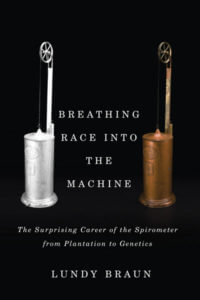
Fleck Prize 2018: Lundy Braun
The Fleck Prize committee is delighted to award Lundy Braun the 2018 Ludwik Fleck Prize for her book Breathing Race into the Machine: The Surprising Career of the Spirometer from Plantation to Genetics (Minnesota, 2014). The Fleck Prize recognizes an outstanding book in the area of science and technology studies (STS).
Breathing Race into the Machine examines the history of the spirometer, which has been used for well over a century to measure lung function. A means of determining strength, vitality, and capacity to engage in strenuous work, the spirometer plays an important role in occupational health and life insurance decisionmaking. Yet physician and historian Lundy Braun has demonstrated, in lucid and engaging prose, how faulty assumptions about the biological basis of race have been built into the machine itself. The technology comes equipped with race correction software and hardware designed to take into account the supposedly inferior lung capacity of non-Whites. The assertion that non-Whites have inferior lung capacity is the result of a 19th century study of Civil War soldiers, conducted by racist scientists. Throughout much of the ensuing century, leading black intellectuals, including W.E.B. Du Bois, repeatedly challenged this conclusion, to no avail. Instead, this supposedly biological difference went largely unquestioned in the medical, public health, and insurance communities until very recently, and continues to drive both public and private decisions. In 1999, for example, the world’s largest insulation manufacturer tried to limit disability claims to non-Whites in a class-action lawsuit brought by 15,000 asbestos workers, based on the spurious science of racial differentiation in lung capacity and function.

2018 Fleck Prize Committee: Shobita Parthasarathy (chair), Daniel Breslau, Tania Pérez-Bustos
Acceptance Statement
I am deeply honored to receive the Ludwig Fleck Prize. The analytic frame of STS inspired this book as I worked to bridge the epistemological frameworks of history of medicine and technology and Africana Studies with particular attention to scientific knowledge production about race over time. It was the lens of STS which provided clarity on how the social and cultural context has shaped and continues to shape the meaning of race as it is deployed in scientific domains. My goal in writing this book was to communicate with clinical practitioners, who engage with spirometry measurements on a daily basis. At the same time, I hoped to further engage STS in the many invisible medical practices central to the making of race — practices that I continue to learn about from my medical students. I am profoundly grateful to the Fleck Prize Committee for all their hard work and to the many insightful STS scholars of the 4S society with whom I have had the privilege to interact over the past two decades. Thank you.
Bio
Lundy Braun is a Professor of Pathology and Laboratory Medicine and Africana Studies and an affiliate of the Program in Science and Technology Studies at Brown University. Originally trained as a cancer biologist, her scholarly projects for the past 20 years include the history of medical technologies as they intersect with race; the history of occupational disease in South Africa; and the contemporary debate over race, health and genomics. As part of this work, she studies how racialized evidence contributes to health inequalities.

